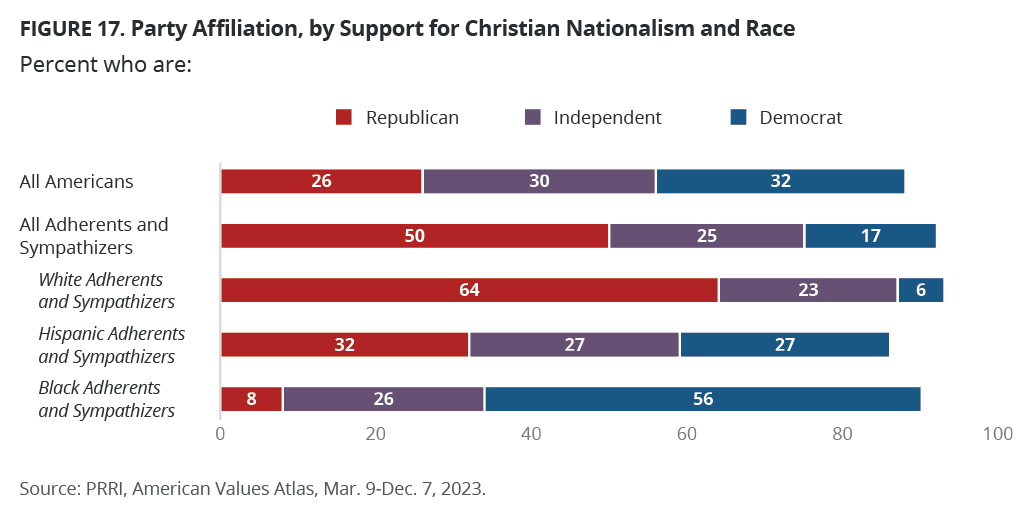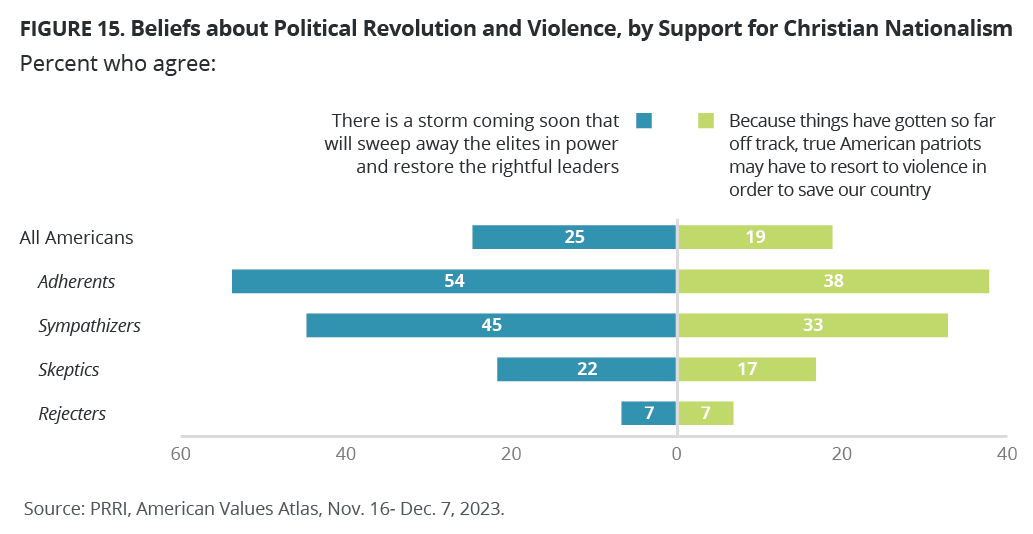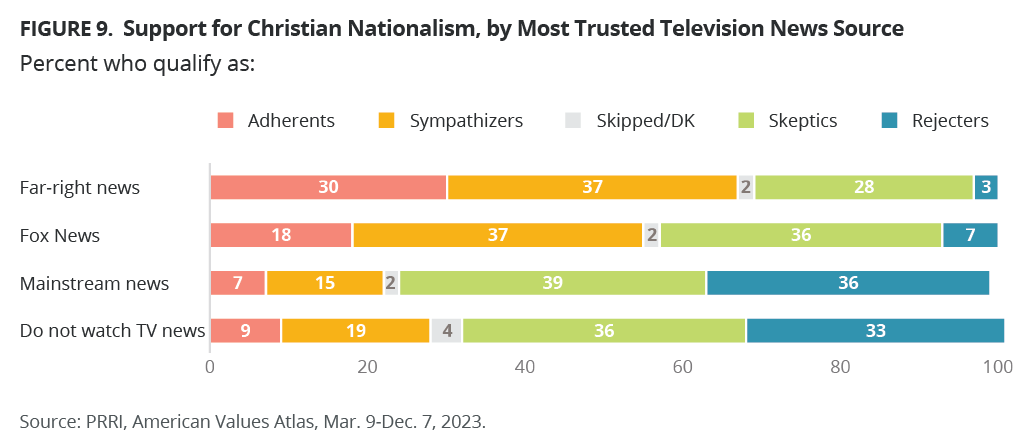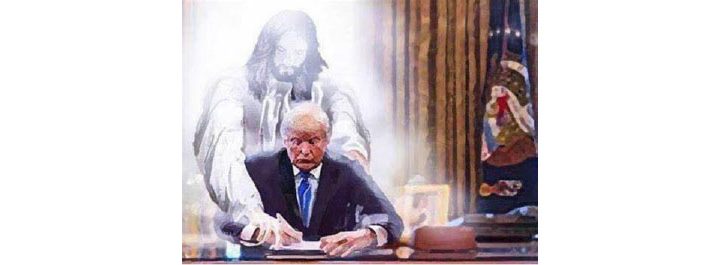The political-religious movement known as Christian nationalism has taken hold in all 50 states, posing an immediate, dire threat to democracy and religion, says an extensive new study.
Public Religion Research Institute President Robert P. Jones said the study, based on more than 22,000 surveys from March through December 2023, is the most comprehensive look yet at Christian nationalism’s aims, sympathizers and adherents.
Moderating a webinar introducing the survey findings, Jones described the movement, which he said is driving support for former President Donald Trump’s 2024 candidacy, as “a dangerous anti-democratic political ideology that undermines true democracy.”
PRRI developed five distinct agree/disagree questions to measure support for Christian nationalism. The more of these statements a person affirms, the most deeply rooted they are in Christian nationalism:
- God has called Christians to exercise dominion over all areas of American society.
- The U.S. government should declare America a Christian nation.
- Being Christian is important part of being truly American.
- If the U.S. moves away from our Christian foundations, we will not have a country anymore.
- S. laws should be based on Christian values.
For the webinar, Jones was joined by three experts on Christian nationalism:
- Katherine Stewart, journalist and author of The Power Worshippers: Inside the Dangerous Rise of Religious Nationalism
- Jemar Tisby, professor of history at Simmons College of Kentucky and author of the New York Times bestselling book, The Color of Compromise: The Truth about the American Church’s Complicity in Racism
- Andrew Whitehead, associate professor of sociology at IUPUI and author of American Idolatry: How Christian Nationalism Betrays the Gospel and Threatens the Church
Stewart, who writes for The New York Times and New Republic among other publications, said two factors link Christian nationalism adherents and sympathizers: per capita income and life expectancy. In states where Christian nationalism is more prevalent, those who favor the movement typically have lower incomes and shorter life spans than those in states with fewer followers.
Those who favor the movement typically have lower incomes and shorter life spans than those in states with fewer followers.
She also said the growth of Christian nationalism support among Latino/Hispanic pastors can be attributed to the expansion of “deeply interconnected” networks that give them tools to spread Christian nationalist messages. These groups engage clergy to get their congregations to vote a certain way and spread far-right conspiracy theories that she called “frankly dangerous.”
“Christian nationalism is more than attitudes; it’s a political dysfunction,” Stewart said. She cited Russia, Hungary and Turkey as examples where political leaders use religion to divide citizens into “those who belong and those who don’t” to boost support for their authoritarianism.
“This leads to the suppression of political opposition and free speech,” Stewart said. “It allows political leaders to capture and control votes to smuggle in regressive policies for their funders, mainly low taxes for the rich and support for extractive industries.”

‘Plantation hierarchy’ of power
Tisby, whose work has been all but outlawed by Florida politicians, pointed out key differences between white and Black adherents of Christian nationalism. He stressed the philosophy should rightly be named “white Christian nationalism” because it espouses a kind of “plantation hierarchy” of power in which white men control government and all others are subordinate.
“We use the same words, but they mean different things,” he said. “Whites seek political dominance, while those historically marginalized want to be part of the public conversation but not to dominate it.”
Tisby also described churches, especially evangelical and Pentecostal churches, as “vectors” or “super-spreaders” of white Christian nationalism messages. He termed white Christian nationalism as “the greatest threat to democracy and the church today.” He said he believes Americans should look to the Black church tradition for alternative ways to engage faith and politics.

Who’s a ‘true American?’
A social scientist who has been studying Christian nationalism for a decade, Whitehead said the PRRI study provides comprehensive empirical evidence for the movement’s infiltration into American politics and culture.
“Three in 10 Americans are sympathetic to the ideas of white Christian nationalism,” he said. “It’s a cultural framework with myths, traditions and symbols, a fusion of American Christianity with politics.”
Whitehead said white Christian nationalists view the world as a chaotic place and want authoritarian leaders to provide social control, even if bringing order means acting violently. Followers seek strong ethnic-racial boundaries built around a national identity, with white, natural-born Anglo Protestants most qualified to call themselves “a true American” and have access to civil liberties that others will be denied, he said.

What it looks like
Jones asked the panelists what white Christian nationalism looks like “on the ground.”
Stewart pointed out the recent Alabama Supreme Court ruling that fertilized embryos used for invitro fertilization are “children” shows the normalization of state control over reproductive rights, including the possible outlawing of popular birth control methods.
Jones added he was “flabbergasted” by the appearance of Alabama Supreme Court Chief Justice Tom Parker on a talk show sponsored by the New Apostolic Reformation, an ultraright religious group seeking to take over American government.
Whitehead said data on whether state laws are extending voting rights or hindering them correlates strongly with the results of PRRI’s Christian nationalism study. He related an anecdote from a pastor who said he’d been challenged by a white Christian nationalist in his church “to the point of finger-jabbing in the chest.”
“The pastor said he felt physically threatened,” the sociologist said. “Americans who embrace Christian nationalism believe they need to restrict the vote and take away voting rights from those who aren’t ‘right Americans.’ White Christian nationalism is having a real effect on real lives.”
Closing the webinar, Jones said he believes America’s new demographic identity as “no longer a majority white Christian nation” is fueling the political movement.
“The change has an apocalyptic feel to it, a desperation about the changes in America that leads to the abandonment of traditional norms and even the embrace of extrajudicial violence,” he said. “Is America a promised land for European Christians or are we a pluralistic democracy that none dominate?”
Related articles:
The Christian case for democracy | Analysis by Mark Wingfield
The threat of Christian nationalism in all 50 states, illustrated in eight charts | Analysis by Robert P. Jones
Christian nationalists are misguided Christians, Anthea Butler says


